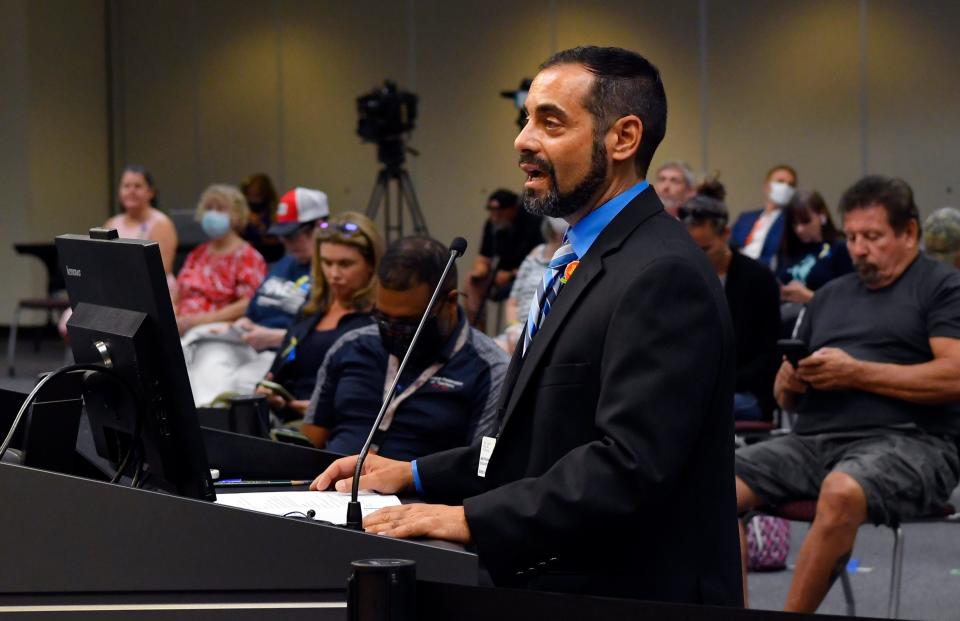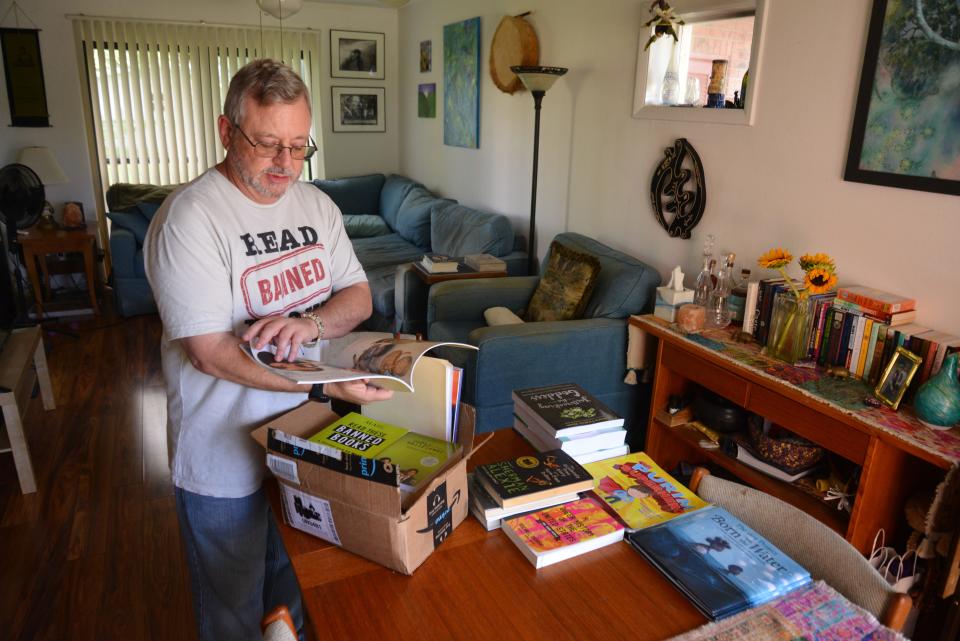Charlie Brown movie and math problems among supplemental items nixed by Brevard principals
"A Charlie Brown Christmas." Extra math problems. An art project about the conservation of energy. These are all items Brevard Public Schools teachers asked to use in their classes to enhance teaching or simply to provide a fun activity for students.
Principals denied all the requests.
In the past, if a teacher saw an opportunity to step outside the textbook and use a video, poem, art project or even additional word problems in a math class to help students better understand a concept, they could freely do so. But now, because of House Bill 1069 — which places the responsibility of overseeing instructional material on principals — they must get permission before using any "supplemental material."
Various reasons were given for recent rejections. Math problems were denied without explanation; the art project, in favor of activities already within the curriculum.
As for "A Charlie Brown Christmas," it was turned down as well, with the principal writing in an email that she would not be approving requests for any supplemental materials until the school had "consistent implementation ... of the required curriculum materials."
It's a process that can take weeks. Some principals are denying the use of all supplemental materials entirely for specific classes.
The consequences of not asking permission could be dire, with one elementary school principal writing to her teachers in an email that if they did not request approval of the use of worksheets, websites, coloring pages, homework packets or any other items not included in the district adopted curriculum, they could face monetary fines, jail time or forfeiture of their teaching certificate and loss of their job.
"I cannot be more serious about this and what it can mean for you," she wrote in the Oct. 19 email obtained by FLORIDA TODAY.
Multiple members of Brevard Federation of Teachers showed up at the Nov. 14 school board meeting, sharing how difficult the new restriction has made it to teach.
"I never hid what I was doing from my administration, but I had the autonomy to make decisions that were best for the students in front of me," said Vanessa Skipper, a former teacher and vice president of BFT.
"Instead of simply focusing on educating our teachers and administrators on making sure that materials brought in are age or developmentally appropriate, we took a new law, over-interpreted it, put more on teachers' and administrators' plates and sucked the autonomy and joy out of our classrooms."
Board to vote on book next meeting: Brevard book committee opts to restrict 'Sold'; book's fate now in hands of school board
Do any Florida districts arm teachers? How does Brevard Public Schools' guardian program compare to other Florida districts?
New restrictions: the when and why
The new rule came at the beginning of the school year as a result of HB 1069, with BPS providing a form for teachers to fill out and turn in to principals. The form requires information including descriptions of the supplemental material, the rationale for using the material, how it will be incorporated into lessons and whether or not the teacher is aware of language in HB 1069 regarding supplemental materials.
HB 1069, which went into effect July 1, lays out rules regarding what is and isn't allowed to be taught in Florida classrooms, saying that principals are responsible for managing materials used within a school. Principals should oversee the proper use of instructional materials and the selection of library media center materials.

"The state legislature was worried about pornography, LGBTQ, (critical race theory), and the district has used it to narrow their curriculum to essentially our textbooks," said Anthony Colucci, president of BFT.
It's not clear to what extent this is happening in other districts. FLORIDA TODAY reached out to teacher unions in multiple counties around the state. Only Volusia County responded, saying they were not currently aware of issues regarding supplemental materials.
Teachers: limited flexibility, no 'teachable moments'
How the new form and restrictions are being handled varies around the district, with some schools more lax than others.
One elementary school principal wrote in an email on Aug. 25 that she would not. be approving any items submitted for math, science or ELA "other than those that serve as organizational tools." Other items would still be given consideration, such as items for social studies or items that served as graphic organizers.
"Our primary objective remains unchanged: to provide all students with a rich academic experience that equips them with the skills and knowledge they need to thrive," she wrote in the email obtained by FLORIDA TODAY.
"By following our established instructional agreements, we ensure that each student receives a consistent and equitable education, regardless of the classroom or school they are in."

Skipper argued that the new rule prevents teachers from attending to the needs of specific classes students.
"Different students needed different materials that would help create the magical light bulb that we're always talking about," she said. "District approved curriculum materials were never enough to accomplish that."
The inability to be flexible with their lessons through the use of supplemental materials is having a profound impact on students and teachers, said Adam Tritt, an advanced placement English teacher at Bayside High School in Palm Bay.
"Any time a teachable moment comes up, which I could cover with a poem or an article or a short video, I actually have to get the permission, fill out a form and get permission through the principal, which means it has destroyed the teachable moment," Tritt said.
Staying within textbooks "bores students to tears," Tritt said, but with the restriction in place, teachers have limited room to stray beyond the state-approved material.
Getting materials approved: 'I have almost lost all motivation'
The restrictions have cast a shadow over not only school faculty, but also students, Tritt said.
"Every day, you're entering enemy territory," he said, adding that absenteeism is higher than he's ever seen it, it's a struggle to find substitute teachers and the task of getting students to complete make-up work is nearly impossible.
"It's becoming so much harder to teach."
An elementary school teacher wrote to BFT about her frustration with supplemental materials with pictures of some of the rejections she had received from her principal.
"I have almost lost all motivation to try to get something else approved," she said. "This ridiculous process of getting supplemental materials approved is taking the joy out of being a teacher."
She added that she's "retraining (her) way of thinking" regarding how she teaches her class.
"Every time I see something that I think my class would like or I see an idea from another teacher that looks interesting, I am now telling myself to stop," she said. "What's the point? This process is taking the creativity out of teaching. Why don't they trust us anymore?"
That question is one many have asked, and one Colucci wishes the district would consider.
"We just think it should be left up to teachers' professional judgement as to what's appropriate and not appropriate," he said.
What's OK, what's not: a blurry line
Challenges about what can and can't be used by teachers have extended beyond just supplemental material, with parents complaining about the curriculum their students are being taught.
Tritt recalled a parent challenging him about content within one of his workbooks he is required to use by the state.
"I was very clear with that parent; I said, 'Talk to your governor,'" he said. "I would never choose to sit in class and use a workbook with my students. This is an order from on high, and if you do not like the material, please talk to the governor."
Other areas are a little blurrier. One high school teacher in Brevard was challenged in November for using "God Bless You, Mr. Rosewater," a 1965 novel by Kurt Vonnegut that follows a multi-millionaire who moves the Rosewater Foundation to his former family home in Rosewater, Indiana. The book contains themes surrounding the American class system, with Rosewater attempting to provide love and money to all who visit his office.
What category that book falls under is not exactly clear. Tritt — who has faced similar challenges with books in his classroom — argues that it would be considered part of the curriculum, while Superintendent Mark Rendell wrote in an email that it was approved as a supplemental material in a state-approved textbook.
Though Rendell asserted that the book was approved by the state in an email obtained by FLORIDA TODAY, he added that it was "inappropriate to use in the classroom."
The email from Rendell — sent to school board members, several administrators and an administrative assistant for the Florida Senate on Nov. 30 — came after a string of emails was sent between a parent, the school principal, the administrative assistant from the Florida Senate and Sen. Debbie Mayfield over the course of the previous two days.
Though the principal reassured the parent that the teacher had stopped using the book after a complaint was received and had switched to another book, the parent wrote to the Senate administrative assistant that she was "trying to work some different angles to get this book taken completely out of the curriculum."
Mayfield then wrote to Rendell and the school board, asking the board to reach out to the parent, who had expressed concern for her daughter and other students "exposed to the graphic nature and uncomfortable classroom discussion about the book."
The teacher did not respond to request for comment from FLORIDA TODAY.
Though Tritt said the book would be considered part of the curriculum, even that no longer provides protection from challenges.
"(Teachers) are using materials that are allowed by the state, suggested and put on the curriculum list by the school board, planned for use during the department meetings, purchased by the department head, and then the teacher finds themself in a position where they have to justify the use of it," he said.
"No one else is being held responsible for this except the teacher, who is at the low rung of the ladder."
Finch Walker is the education reporter at FLORIDA TODAY. Contact Walker at 321-290-4744 or fwalker@floridatoday.com. X: @_finchwalker.
This article originally appeared on Florida Today: 'A Charlie Brown Christmas' among items nixed by Brevard principals
